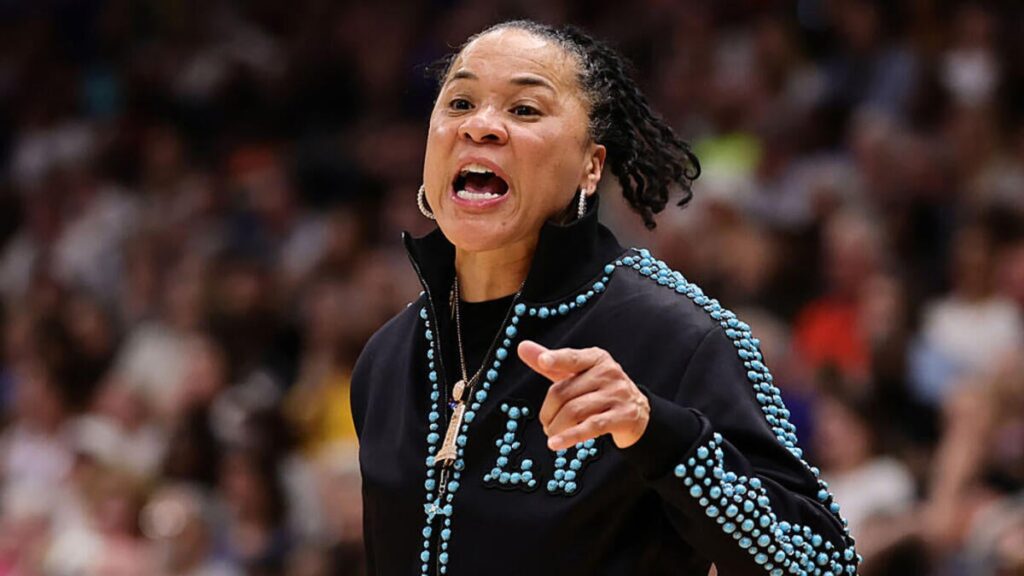South Carolina women’s basketball coach Dawn Staley is an Olympic gold medalist, true crime aficionado, dedicated dog mom and so much more. In her new book “Uncommon Favor” — which hit shelves on May 20 — Staley touches on some of her passions while also sharing the life experiences that helped shape her into a championship-winning coach.
Through “Uncommon Favor,” readers learn a lot about what drives Staley and discovered some candid moments that provide a glimpse into her personality. With that in mind, CBS Sports decided to share five highlights from Staley’s new autobiography.
Her life motto comes from the movie ‘House Party’
After being cut from the 1992 USA Olympic team, Staley was forced to continue her basketball career in Spain. To combat the disappointment of missing the Olympic team and her homesickness, Staley decided to watch the “House Party” movie trilogy. While watching these classic comedic films, Staley stumbled across a scene that would change the way she views life.
“There was a scene in one of the films where Kid ‘n Play were partying and messing around, and a professor catches them and reads them the Riot Act,” Staley recalls. “As he’s schooling them, the professor concludes his lecture, saying sternly, ‘You have to do what you don’t want to do to get what you want.’
“My brain froze when I heard that line. I was like, ‘Ohhhh. That’s why I’m here.’ That message wasn’t for you, Kid ‘n Play. That message was for me.”
After that, she decided to “suck it up” and continue gaining experience by playing abroad because she knew it could eventually help her make a future USA Olympic team.
Tara VanDerveer inspired Staley
Dawn Staley made the the final Team USA roster for the 1996 Summer games in Atlanta. In doing so, legendary Stanford women’s basketball coach Tara VanDerveer became her Olympic head coach. In “Uncommon Favor,” Staley recalled VanDerveer’s rigorous training camp requirements the coach would monitor closely.
Staley described VanDerveer’s coaching style as “calculating, methodical, manipulative even,” while also saying she has nothing but respect for VanDerveer, referring to her as a “genius” and a “savant.”
When Staley started her own coaching career, she borrowed some of her techniques. She even used the same Olympic training camp workouts on her own players.
“My thinking was, if these young women do half of this, we’re goin to be in pretty darn good shape,” Staley wrote.
Staley made Allen Iverson nervous
The lives of NBA legend Allen Iverson and Staley complement each other in a special way.
Iverson became the face of the NBA and a league MVP in Staley’s hometown of Philadelphia as a member of the 76ers. As for Staley, she started the her journey to basketball stardom in Iverson’s homestate at the University of Virginia. On top of this, they’re both smaller backcourt players who dominated their bigger opponents.
These physical similarities made Iverson an inspiration for Staley. To her, the 6-foot shooting guard made up for his lack of size with “swagger and style.” They eventually became friends. In doing so, she learned that Iverson admired her as much as she admired him.
“He told me he was nervous when we first met,” Staley wrote. “Apparently, I was his favorite player while I was at Virginia. He watched me on television, just as I’d watched him while he was in Philly. … We have a unique bond from playing in each other’s home states. He tells folks I’m his favorite women’s basketball player of all time, a compliment that humbles me.”
Staley’s built for the college sidelines
Staley interviewed for the Portland Trail Blazers’ head coaching position in 2021. In “Uncommon Favor”, she recalls joining a Zoom interview during which five Blazers employees asked her a host of questions that focused mostly on analytics and superstar players.
Staley didn’t have NBA experience, but she said she was still treated as a serious candidate. A few days later, they told her the team was going in a different direction. Eventually, they hired NBA champion Chauncey Billups.
Still, Staley wasn’t upset she didn’t get the job because the experience put her career in perspective.
“I appreciated the consideration. But in the end, it reminded me why coaching young women remans the ideal scenario for me,” Staley wrote. “I don’t want to massage egos and worry about analytics, though that’s till part of my job. What I want is to change generations through playing the game. … For me, there’s just something about women’s college basketball that looks, sounds, and feels right.”
Handling success isn’t easy
Winning her first Olympic gold medal in 1996 was an exciting experience for Staley. It was a life goal for her and she proudly took it back to Philly, where she gave it to her mom. However, in the following weeks, the realization that she’s reached her mountaintop caused her to slip into an unexpected depression.
“I didn’t know my own body. My head felt detached,” Staley wrote. “I was exhausted and numb. Sad, but I couldn’t cry. It was as if I was watching myself from afar, going through the motions of life. … Lifelong aspirations: Check. Now what?”
Staley’s Olympic coach, VanDerveer, often recited a famous Bobby Knight phrase: “Mental is to the physical as four is to one.” This stuck with Staley, and she knew she had to work on her mental health to be the best version of herself on the court. Eventually, she told Lisa Boyer — Staley’s coach when she played for the ABL’s Philadelphia Rage — that she couldn’t make it to training camp.
Staley took two weeks off, but felt guilty about not being with her teammates. Boyer, however, told her to take all the time she needed. In the process, she helped Staley “climb out of those dark, post-Olympic days” by showing grace and being supportive.
Read the full article here


